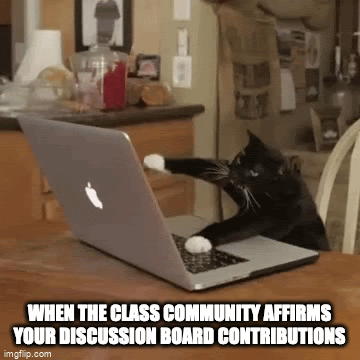
Support online class engagement through guided communication
One thing that transforms a good class into a great class is a classroom community. Creating a class bond not only makes for an enjoyable experience, but increases engagement in course materials and supports learning. Offering both formal and casual discussion forums is the best way to forge connections, but many students need guidance to confidently navigate these spaces in an online course.
Linguists Caroline Coffin and Jim Donohue (2014) found that students who were not clear about the conventions of classroom communication engaged less in online course spaces than students who were familiar with discussion expectations. As you work toward building a class community this semester, consider the ways you can provide clear expectations and guidance for both formal and casual discussions.

Add delivery instructions to discussion-based assignments
No matter how digitally literate your students are, writing in a discussion forum may be a new task with uncertain requirements. Coffin and Donohue (2014) note that online class discussions are useful not only for learning course content, but also for gaining familiarity with the communication conventions of the field. Reflect on conventions you’ve come to expect through working and teaching in your discipline, and then delineate those requirements for your students. In your assignment instructions, add a section for writing expectations or create a page with anonymous examples of strong posts from previous classes.
Embrace the power of emojis 😎
Not all discussions need to include formal writing evaluation. Assess the goal for your discussion-based assignments. Do they require edited academic English? If your goal is to check understanding and build community, much like a small-group discussion in a classroom, consider loosening up your writing guidelines. According to Young (2010), all dialects and levels of formality can express rigorous ideas, so experiment with discussion assignments where students can write like they speak. Further, offer options for visual and verbal communication, including emojis, memes or video responses. Not only can this make discussion more fun, but also affirms the value of different forms of expression.
Join the conversation
While many instructors worry that joining in on discussion forums will create an instructor-centered conversation, there are ways to show up while also prioritizing student voices. Try creating your own post in the discussion forum to model assignment requirements. Or participate in the discussion by asking generative questions and directing students to resources while avoiding correcting responses.
Adding to discussion forums also offers an opportunity to respond to students that did not receive comments from their peers. In Coffin and Donohues’ research (2014), one student noted that in his discussion forum work, “what upset me was most of the others would respond if you wrote anything in and I got no response… . I sort of lost my confidence and I thought I haven’t got anything valuable to say so I didn’t write anything” (p. 206). By participating in the discussion forums, you can look for opportunities to affirm a student’s contributions.
Create free discussion zones
While Martin et al. (2018) found that open-ended social discussion threads do not extensively benefit engagement, there are many ways to create designated zones where students can connect without being graded on their communication style. Experiment with creating self-sign up groups where students can create study teams. In Canvas, setting up a group will open up a “mini course shell” for those students, where they can create their own discussion posts and announcements or decide on their own preferred discussion method. For a more hands-on approach, consider creating interactive activity spaces like virtual escape rooms or Zoom games, or use educational messaging platforms like Slack or Flipgrid.
References
Coffin, Caroline, & Donohue, Jim. (2014). “I Feel Very New to It and Very Inexperienced”: Semantic Orientation, Semiotic Mediation, and the Genres and Registers of Online Discussion Forums. Language Learning, 64(s1), 205–254. https://doi.org/10.1111/lang.12042
Martin, Florence, Wang, Chuang, & Sadaf, Ayesha. (2018). Student perception of helpfulness of facilitation strategies that enhance instructor presence, connectedness, engagement and learning in online courses. The Internet and Higher Education, 37, 52–65. https://doi.org/10.1016/j.iheduc.2018.01.003
Young, Vershawn Ashanti. (2010). Should Writers Use They Own English? Iowa Journal of Cultural Studies, 12(1), 110–117. https://doi.org/10.17077/2168-569X.1095





Way to cite Young’s work Elle!
Thanks Sarah! That’s such a great article.